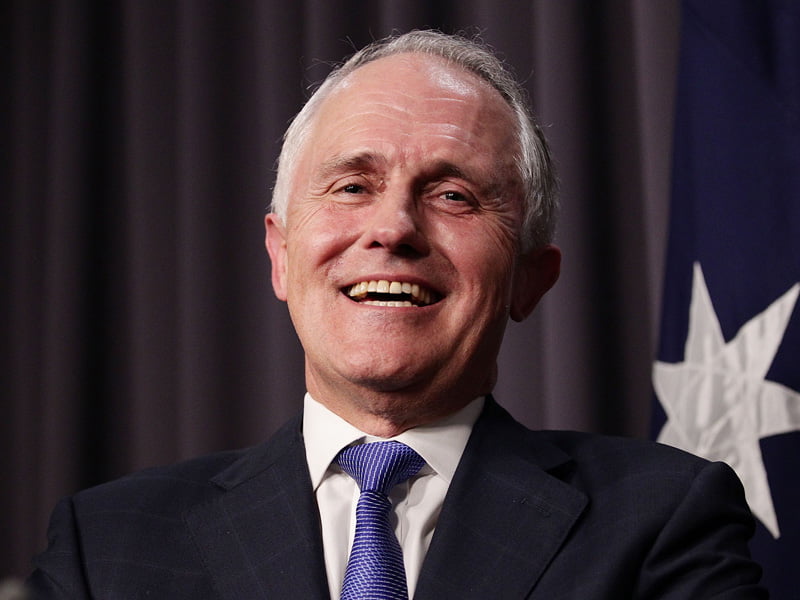The swearing in of Malcolm Turnbull as Australia’s 29th Prime Minister will inevitably bring the powerful technological forces that are re-shaping our economy into sharper focus.
This was one of the great failures of the government under Tony Abbott, and his Treasurer Joe Hockey. It did not articulate a positive response to the challenges and the opportunities presented by transformational technology.
When you change the government, you change the nation is the axiom. And the same is true in the case of the change of Prime Ministers. And the change that occurred last night after an extraordinary day in Canberra, are overwhelmingly positive for the technology sector.

In his first press conference as leader of the Liberal Party and as Prime Minister-designate, Mr Turnbull promised to lead “a thoroughly Liberal government” where the freedom of the individual and freedom of the market are paramount.
Addressing the challenges facing the economy he spoke of the digital forces that are shaping the world economy, speaking the language of technology.
“The Australia of the future has to be a nation that is agile, that is innovative, that is creative. We can’t be defensive, we can’t futureproof ourselves,” Mr Turnbull said.
“We have to recognise that the disruption that we see driven by technology, the volatility in change is our friend if we are agile and smart enough to take advantage of it.”
“There has never been a more exciting time to be alive than today and there has never been a more exciting time to be an Australian.”
“We will ensure that all Australians understand that their government recognises the opportunities of the future and is putting in place the policies and the plans to enable them to take advantage of it.”
This is important. In pointing to the challenges and opportunities of internet-based economic forces, he is already dropping important cultural markers.
If culture flows from the top, we now have a Prime Minister who for the first time is speaking the language of the industry, and bringing it directly into the mainstream economic conversation.
Mr Turnbull pointed to the successes of New Zealand Prime Minister John Key as someone who has achieved “very significant economic reform by explaining complex issues” and bringing the public with him in building intelligent policy.
It is too early to devote too much energy to reading the tea leaves about policy specifics. But it is clear that he will bring important components of the Communications portfolio around digital policy into the fold of the Prime Minister’s Office.
Importantly, he is likely to restructure the nexus between Communications and the Finance portfolios. Specifically, there will be sweeping changes to the way that the Commonwealth’s $6 billion technology budget is spent.
The Digital Transformation Office will enjoy both a bigger profile in government and will be given greater powers to shape government purchases, and to change back-end administrative information machinery of government process.
Prior to the 2013, Malcolm Turnbull had fully expected to be given responsibility for government ICT – to use the power of Commonwealth as the largest buyer and user of technology to drive cultural change across the digital economy.
This did not happen, and a series of election promises related to ICT procurement that were made before the 2013 poll did not come about as a result.
The DTO had been modelled on the UK’s Government Digital Service. But in the end, Australia was given a cut-down version that was charged with tinkering with the service interface between government and citizens.
This role will be expanded. Specifically, procurement mechanisms will be put in place to give the DTO far greater power over technology decisions in government.
Greater oversight and direction will come directly from the Prime Minister’s Office, and digital transformation issues will become a Cabinet issue with priority profile that is far greater than any previous government.
Mr Turnbull as Prime Minister will not be spending his days getting into the weeds of digital policy. But he will certainly set direction.
He will drive significant cultural change within the Australia Public Service that puts digital, citizen-centric services at the heart of government delivery processes. It will not be a side issue of the Communications portfolio, but a central issue of government.
He has spoken often of the economy-wide productivity improvements that can be delivered through the more efficient delivery of government services. The public sector makes up about a third of the Australian economy, such that any efficiency improvements to government service deliveries can have a material impact on Australia’s broader productivity numbers, and ultimately GDP.
Specifically, we can expect to hear much talk of government-as-a-platform, and an accelerated understanding of concepts of Open Government. The definitions of what constitutes a government service will change – and the private sector will almost certainly have more opportunity to deliver these government services.
Open Government, and government-as-a-platform structures play to Mr Turnbull’s deep belief in markets. If it is possible to create a market for a government service – and there are many areas where this can make sense – then it is likely structures will be put in place to enable these markets to operate.
This presents tremendous opportunities for Australian innovators, and for small Australian technology providers.
The great imponderable is the NBN. But it is unlikely to change significantly. And certainly anyone hoping the elevation of Mr Turnbull to the Prime Ministership will mean a return to a Labor-esque fibre-to-the-node network will be disappointed.
The direction of the NBN has been set. And with roll-out seemingly starting to gather pace, a new Communications Minister – whoever that is – will make little difference to that direction.
Do you know more? Contact James Riley via Email.

